Philadelphia has recently implemented a new Plastic Bag Law that aims to reduce the use of single-use plastic bags and promote sustainable alternatives. This law, which went into effect on July 1, 2021, has sparked discussions and debates among residents and businesses alike. Understanding the details of this law is essential for both consumers and retailers to ensure compliance and make informed choices.
The Plastic Bag Law in Philadelphia bans retailers from providing customers with single-use plastic bags at the checkout counter. This includes grocery stores, convenience stores, and other businesses that sell goods and merchandise. Instead, customers are encouraged to bring their reusable bags or purchase paper bags for a small fee.
The goal of this law is to reduce the environmental impact of plastic bags, which are not biodegradable and contribute to pollution in landfills, waterways, and oceans. By discouraging the use of plastic bags, Philadelphia hopes to promote a more sustainable and eco-friendly way of shopping, encouraging residents to adopt reusable alternatives and make conscious choices about their consumption habits.
- Background and Purpose
- Plastic Bag Restrictions
- Banned Bags
- Allowed Bags
- Alternative Options
- Reusable Bags
- Paper Bags
- No Bags
- Benefits and Impact
- Enforcement and Penalties
- Question-answer:
- What is the plastic bag law in Philadelphia?
- When did the plastic bag law in Philadelphia go into effect?
- How much is the fee for plastic bags in Philadelphia?
- Are there any exemptions to the plastic bag law in Philadelphia?
Background and Purpose
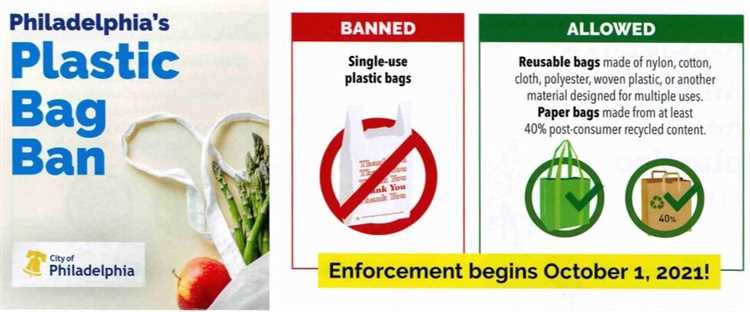
The Plastic Bag Law in Philadelphia was implemented in order to address the environmental concerns associated with the use of single-use plastic bags. The purpose of this law is to reduce the amount of plastic waste generated in the city and promote the use of reusable bags.
Plastic bags have become a significant environmental problem due to their non-biodegradable nature. They take hundreds of years to break down, and during this time, they can cause harm to wildlife and their habitats. Plastic bag litter is also a common sight in urban areas, clogging up drains and polluting waterways.
By discouraging the use of single-use plastic bags, the Plastic Bag Law aims to encourage residents and businesses to adopt more sustainable practices. The law requires retail establishments to charge a fee for each single-use plastic bag used by customers, with the goal of reducing the overall consumption of these bags.
In addition to reducing plastic waste, the law also aims to promote the use of reusable bags as an alternative to single-use plastic bags. Reusable bags are made from durable materials and can be used multiple times, reducing the need for disposable bags. They are also generally more spacious and sturdier than plastic bags, making them a more convenient option for carrying groceries and other items.
By implementing the Plastic Bag Law, Philadelphia joins a growing number of cities and states across the United States that have taken action to address the plastic bag problem. These efforts are part of a broader movement towards sustainable practices and reducing plastic waste for the benefit of the environment and future generations.
It is important for residents and businesses in Philadelphia to understand the background and purpose of the Plastic Bag Law in order to comply with its requirements and contribute to the city’s sustainability initiatives.
Plastic Bag Restrictions
Philadelphia has implemented strict regulations on the use of plastic bags in an effort to reduce environmental pollution and promote sustainable practices. Under the Plastic Bag Law, businesses are required to follow certain restrictions when providing bags to customers.
Banned Bags
The law prohibits the use of single-use plastic bags that are less than 2.25 mils thick. This includes conventional grocery bags, as well as traditional “T-shirt” bags commonly used at convenience stores and pharmacies. These bags are not biodegradable and can take hundreds of years to break down.
Allowed Bags
Businesses are encouraged to offer reusable bags made of materials such as cloth, canvas, or durable plastic that exceeds the prescribed thickness limit. These bags are designed to be used multiple times, reducing the overall demand for single-use bags. Customers are encouraged to bring their own reusable bags when shopping.
In addition, businesses may provide compostable bags that meet specific certification requirements. These bags are made from plant-based materials and are designed to break down in composting facilities, reducing their environmental impact.
Exemptions: Certain items are exempted from the restrictions on plastic bags, including bags used for fresh produce, meat, seafood, prescription drugs, newspapers, and dry cleaning. These items typically require separate packaging for sanitation and safety reasons.
Please note that businesses found violating the Plastic Bag Law may be subject to fines and penalties. It is important to understand and comply with the regulations to contribute to a cleaner and more sustainable Philadelphia.
Alternative Options
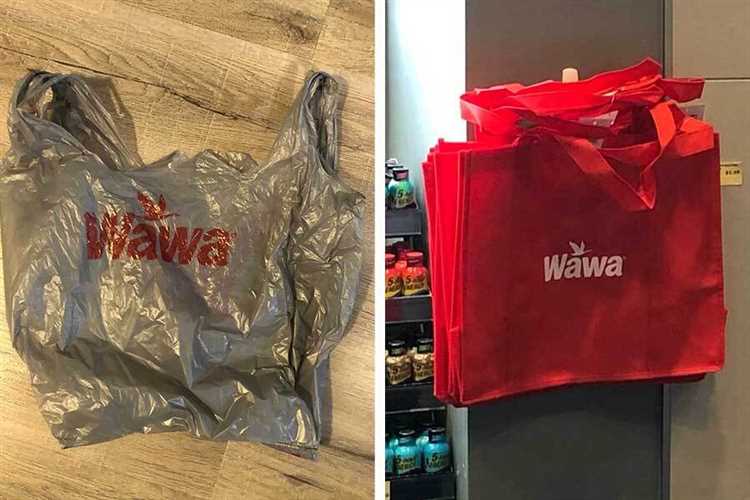
If you’re looking for alternatives to using plastic bags in Philadelphia, there are a number of options available to you. These alternatives are not only more environmentally friendly, but they can also be more stylish and convenient.
Reusable Bags
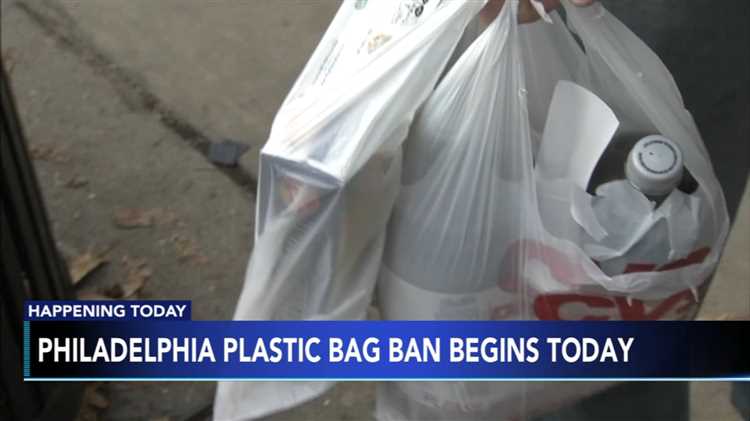
One popular alternative to plastic bags is using reusable bags. These bags are made from durable and washable materials such as canvas or nylon. Many stores offer their own reusable bags for purchase, but you can also find them at health food stores, online retailers, or even make your own. Using reusable bags not only reduces plastic waste, but it can also be a fashion statement with many different designs and patterns to choose from.
Paper Bags
Sometimes when you forget your reusable bags, you may need to opt for a different alternative. In these situations, consider using paper bags instead of plastic. While paper bags are not as durable as reusable bags, they are still a better option for the environment compared to plastic bags. Many stores in Philadelphia offer paper bags as an alternative, and they can be recycled or composted after use.
No Bags
An even simpler option is to forgo bags altogether. If you’re only purchasing a few items or don’t mind carrying them in your hands, you can decline a bag at the checkout. This saves resources and reduces waste. However, be sure to consider the size and weight of your items before making this choice.
Remember, the plastic bag law in Philadelphia is aimed at reducing the environmental impact of single-use plastic bags. By making small changes to our shopping habits and opting for alternative options, we can all contribute to a greener and cleaner city.
Benefits and Impact
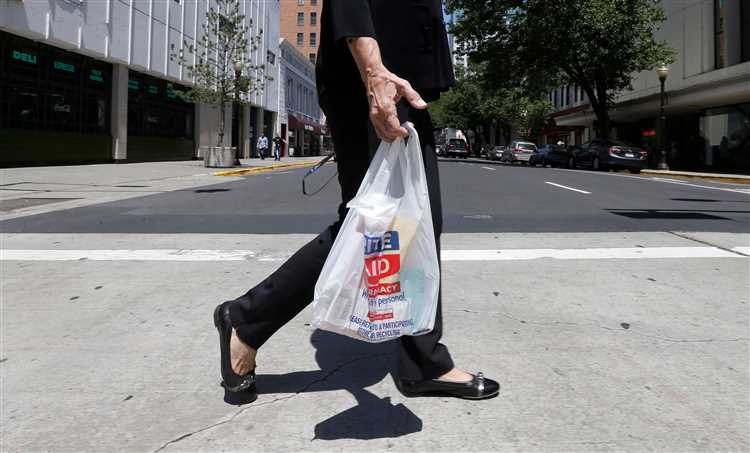
Philadelphia’s plastic bag law is designed to bring about several significant benefits and impact in the community. By reducing the use of single-use plastic bags, the city aims to address the environmental and social concerns associated with plastic waste.
One of the main benefits of the plastic bag law is the reduction of plastic pollution. Plastic bags are one of the most common forms of litter found in the environment, and they can have devastating effects on wildlife. By encouraging the use of reusable bags or charging a fee for plastic bags, the law aims to minimize the amount of plastic waste that ends up in landfills or as litter.
Another important impact of the law is the promotion of sustainable consumer habits. By making it less convenient to use single-use plastic bags, the law encourages individuals to adopt reusable alternatives. This change in behavior not only reduces plastic waste but also promotes a culture of sustainability and mindful consumption.
Furthermore, the plastic bag law has economic benefits for the city. By reducing the amount of plastic waste generated, the city saves money on waste management and cleanup efforts. Additionally, the law encourages the use of locally made and reusable bags, supporting local businesses and creating job opportunities in the manufacturing and distribution of these bags.
The plastic bag law also aligns with the city’s broader sustainability goals. Philadelphia has committed to reducing waste and increasing recycling rates, and the reduction of single-use plastic bags is a step towards achieving these goals. By implementing this law, the city demonstrates its commitment to protecting the environment and improving the overall quality of life for its residents.
Overall, the plastic bag law in Philadelphia brings numerous benefits and impact to the community. It helps reduce plastic pollution, encourages sustainable consumer habits, provides economic benefits, and supports the city’s sustainability goals, making it a significant and necessary policy for creating a more sustainable future.
Enforcement and Penalties
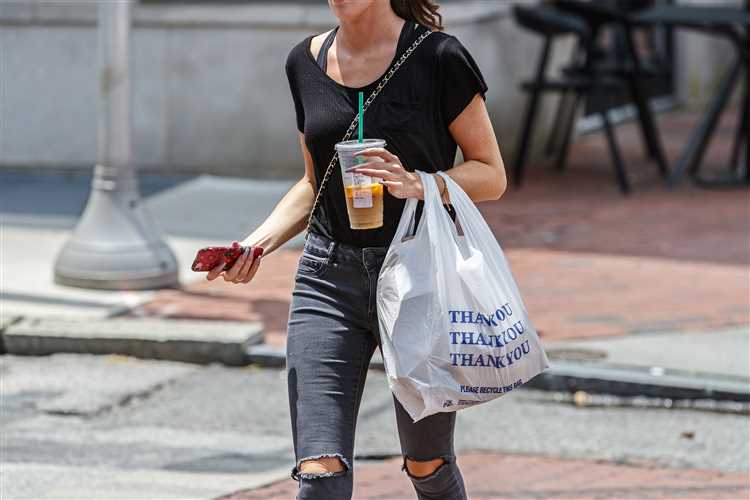
The enforcement of the plastic bag law in Philadelphia is overseen by the Department of Licenses and Inspections (L&I). L&I has the authority to conduct inspections and audits of businesses to ensure compliance with the law.
If a business is found to be in violation of the plastic bag law, there are a range of penalties that can be imposed. These penalties are designed to encourage compliance and discourage the use of plastic bags. The specific penalty depends on the number of violations and the severity of the offense.
For a first offense, businesses may receive a written notice of violation and be required to attend an educational session on the plastic bag law. Subsequent offenses may result in fines ranging from $75 to $300 per violation. In some cases, businesses may also be required to cease providing plastic bags for a specified period of time.
It is important for businesses to understand and comply with the plastic bag law to avoid penalties. L&I may conduct inspections at any time, and businesses found to be in non-compliance can face significant financial consequences. Additionally, public complaints about businesses not complying with the law are taken seriously and may trigger an inspection.
By enforcing the plastic bag law and imposing penalties on non-compliant businesses, Philadelphia aims to reduce the use of single-use plastic bags and promote the use of reusable alternatives. The hope is that by discouraging the use of plastic bags, the city can reduce litter, protect wildlife, and improve the overall environmental health of Philadelphia.
Question-answer:
What is the plastic bag law in Philadelphia?
The plastic bag law in Philadelphia is a regulation that requires retailers to charge customers a fee for each plastic bag used at checkout. The law aims to encourage consumers to bring their own reusable bags and reduce plastic waste.
When did the plastic bag law in Philadelphia go into effect?
The plastic bag law in Philadelphia went into effect on October 1, 2020. It was initially scheduled to start on July 2, 2020, but was postponed due to the COVID-19 pandemic.
How much is the fee for plastic bags in Philadelphia?
The fee for plastic bags in Philadelphia is $0.15 per bag. Retailers are required to charge this fee for each plastic bag used at checkout, and the fee is applied to both single-use plastic bags and thicker reusable plastic bags.
Are there any exemptions to the plastic bag law in Philadelphia?
Yes, there are exemptions to the plastic bag law in Philadelphia. Certain types of bags, such as those used for loose bulk items, prescription drugs, and newspapers, are exempt from the fee. Additionally, individuals who receive public assistance benefits are also exempt from the fee.